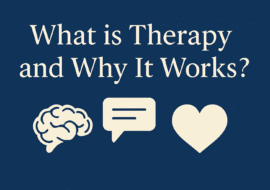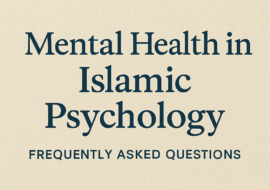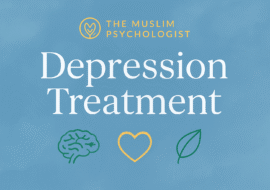Don’t be Sad? The Truth About Sadness and Faith
The phrase “Do not be sad” appears in the Qur’an in moments of deep emotional turmoil. While often interpreted as a call to suppress sadness, both modern psychology and Islamic tradition reveal something much deeper: sadness is not a failure of faith, but part of the human journey toward meaning and healing.
What is Sadness – Psychologically and Neurologically?
From a neuroscience perspective:
Sadness activates brain regions such as the anterior cingulate cortex and insula, involved in emotional Sadness is a core human emotion, biologically encoded and essential to survival and adaptation. Unlike fear (which prompts immediate action), sadness is often associated with loss, disappointment, helplessness or disconnection.
- regulation and social pain (Eisenberger et al., 2003).
- Neurotransmitters like serotonin and dopamine decrease, which can lower motivation but encourage reflection and inward focus.
- Sadness also promotes social bonding and help-seeking behavior by signaling vulnerability (Keltner & Gross, 1999).
📚 In The Neuroscience of Emotion (Adolphs & Anderson, 2018), the authors explain that sadness slows the mind and body down, helping us process and reorganize our priorities after emotional impact. It is not dysfunctional — it is adaptive.
What Sadness Offers Us (Functionally and Spiritually)
Psychologically, sadness helps:
- Regulate attachment (loss triggers reflection on relationships),
- Encourage mental rest and withdrawal for integration,
- Prompt empathy and connection with others (Levenson, 1999),
- Foster spiritual and existential awareness, especially during hardship.
In therapeutic approaches such as Emotion-Focused Therapy (EFT) or Acceptance and Commitment Therapy (ACT), sadness is viewed as a messenger rather than a problem to fix. Denying sadness, on the other hand, can lead to emotional numbness, anxiety, or psychosomatic distress.
Sadness in the Qur’an – A Human and Sacred Experience
Far from denying emotion, the Qur’an recognizes sadness as a legitimate and sacred human response:
1. Prophet Muhammad ﷺ and Abu Bakr (Surah At-Tawbah 9:40):
“Do not be sad. Indeed, Allah is with us.”
At a moment of danger and uncertainty in the cave, the Prophet ﷺ reassures his companion — not by denying the fear, but by anchoring it in divine presence.
2. Ya‘qub (Jacob) and the Loss of Yusuf (Surah Yusuf 12:84):
“And his eyes turned white from grief, for he was sorrowful.”
The Prophet Ya‘qub’s sadness was intense, prolonged, and physiological — yet he remained patient and spiritually grounded.
3. The Mother of Musa (Surah Al-Qasas 28:7–10):
“We inspired her… Do not grieve. We will return him to you.”
Her distress is met not with blame, but with reassurance and divine promise.
These verses validate emotional depth as compatible with prophethood, faith, and divine proximity.
Islamic Psychology and the Legitimacy of Emotion
Classical Muslim scholars acknowledged the psychosomatic and spiritual dimensions of emotion:
- Ibn Sina (Avicenna) described grief (ḥuzn) as a natural response to loss that can affect both soul and body. In Canon of Medicine, he writes about how strong emotions alter physical states and require both rational understanding and spiritual anchoring.
- Imam Al-Ghazali noted in Iḥyā’ ‘Ulūm al-Dīn that sadness, fear, and longing (shawq) are signs of the heart’s sensitivity. He viewed them not as defects, but as paths to purification and nearness to Allah.
“The heart must be allowed to feel, for it is through its movement that one draws near to the Truth.”
Misusing “Do Not Be Sad” – A Psychological Harm
When “do not be sad” is used out of context — as a way to silence or dismiss — it can create psychological pressure. It:
- discourages emotional expression,
- invalidates inner experience,
- and associates sadness with spiritual failure.
Instead, a more accurate understanding would be:
“You are sad — and you are not alone. Allah is near.”
Normalising Sadness in Therapy and Spiritual Life
In therapeutic practice, we normalize sadness as part of the healing process. Clients are encouraged to:
- allow grief without shame,
- connect with others through emotional honesty,
- and find meaning through both psychological exploration and spiritual reflection.
Faith does not eliminate emotion — it frames it within mercy, meaning, and connection.
Final Reflection
“Do not be sad” is not a dismissal. It is a divine comfort, a message of presence and trust in the midst of uncertainty.
“Indeed, with hardship comes ease.” (Surah Ash-Sharh 94:6)
Sadness is not a sign of spiritual weakness. It is a passage — one that can lead, with compassion and support, to greater awareness, strength, and closeness to Allah.
📚 References
Adolphs, R., & Anderson, D. J. (2018). The neuroscience of emotion: A new synthesis. Princeton University Press.
Eisenberger, N. I., Lieberman, M. D., & Williams, K. D. (2003). Does rejection hurt? An fMRI study of social exclusion. Science, 302(5643), 290–292. https://doi.org/10.1126/science.1089134
Keltner, D., & Gross, J. J. (1999). Functional accounts of emotions. Cognition and Emotion, 13(5), 467–480. https://doi.org/10.1080/026999399379140
Levenson, R. W. (1999). The intrapersonal functions of emotion. Cognition and Emotion, 13(5), 481–504. https://doi.org/10.1080/026999399379159
Ibn Sina (Avicenna). (1999). The Canon of Medicine (Al-Qanun fi al-Tibb) (Laleh Bakhtiar, Trans.). Kazi Publications. (Original work published ca. 1025 CE)
Al-Ghazali, A. H. M. (2004). The Revival of the Religious Sciences (Iḥyā’ ‘Ulūm al-Dīn) (N. A. Faris, Trans.). Islamic Book Trust. (Original work published ca. 1100 CE)




